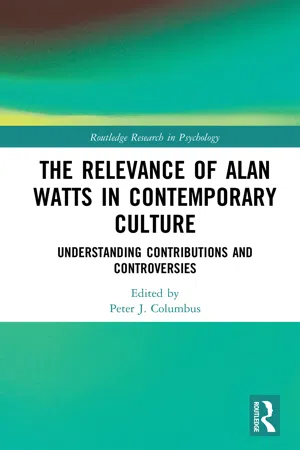
The Relevance of Alan Watts in Contemporary Culture
Understanding Contributions and Controversies
Peter J. Columbus, Peter J. Columbus
- 232 páginas
- English
- ePUB (apto para móviles)
- Disponible en iOS y Android
The Relevance of Alan Watts in Contemporary Culture
Understanding Contributions and Controversies
Peter J. Columbus, Peter J. Columbus
Información del libro
Whilst accounting for the present-day popularity and relevance of Alan Watts' contributions to psychology, religion, arts, and humanities, this interdisciplinary collection grapples with the ongoing criticisms which surround Watts' life and work.
Offering rich examination of as yet underexplored aspects of Watts' influence in 1960s counterculture, this volume offers unique application of Watts' thinking to contemporary issues and critically engages with controversies surrounding the commodification of Watts' ideas, his alleged misreading of Biblical texts, and his apparent distortion of Asian religions and spirituality. Featuring a broad range of international contributors and bringing Watts' ideas squarely into the contemporary context, the text provides a comprehensive, yet nuanced exploration of Watts' thinking on psychotherapy, Buddhism, language, music, and sexuality.
This text will benefit researchers, doctoral students, and academics in the fields of psychotherapy, phenomenology, and the philosophy of psychology more broadly. Those interested in Jungian psychotherapy, spirituality, and the self and social identity will also enjoy this volume.
Preguntas frecuentes
Información
Part I
Humanistic Psychology
1 Jung Watts
Notes on C. G. Jung’s Formative Influence on Alan Watts
“Difficulties Encountered by a European in Trying to Understand the East”
Serious interest in the philosophical and religious legacy of India is, for the most part, confined to academicians, to a certain species of scientist whose practice it is to kill everything he touches by dissecting, analyzing, and classifying it – and then putting it away on a shelf for the use of specialists only.(p. 151)
This, in fact, is the Western way of hiding one’s own heart under the cloak of so-called scientific understanding. We do it partly because of the miserable vanite des savants which fears and rejects with horror any sign of living sympathy, and partly because an understanding that reaches the feelings might allow contact with the foreign spirit to become a serious experience.(Jung, cited in Watts, 1935/1997b, p. 151)